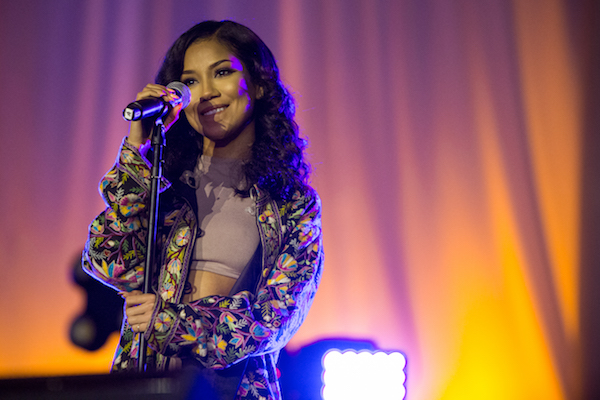
As the full moon of May 21 illuminated the Los Angeles sky, a star-packed lineup of Asian Pacific American artists came together on the front steps of City Hall for the inaugural Pacific Bridge concert, a free-to-the-public celebration of the community’s heritage and contributions.
Headlined by Grammy-nominated singer Jhené Aiko, the show — which doubled as the closing ceremony to the city’s Asian Pacific American Heritage Month (APAHM) — featured performances by Dumbfoundead and Awkwafina, Run River North, Joseph Vincent, Tribal Theory and Kevin Oh.
“I think sometimes when it comes to civic institutions like the City Council, or other political institutions, people don’t necessarily think about Asian Americans. We’re often invisible,” said Jenny Yang, Buzzfeed contributor and event emcee. “For us to physically be here and take over these steps to celebrate our heritage and our talent is huge. I think it’s one way for us to make a statement and say, ‘We’re a part of the city, too.’”
APAHM, with its community events held every May, was first introduced to the city three decades ago. Programming this year included a Chinatown tour, a Taiwanese American heritage festival and a student essay contest.

Councilman David Ryu, whose election last July made history by making him the first-ever Korean American elected to the City Council, and the first Asian in 20 years, played a pivotal role in helping the month come to fruition as co-chair. According to Ryu, APAHM was put on a back burner in recent years due to a bad economy and budget cuts.
“This is the first year we’re celebrating in such a tremendous fashion,” Ryu said. “[APAHM] is to celebrate Asian heritage, and to say, ‘I’m proud to be Asian American.’ The city of L.A., we’re the best city in the world. We celebrate diversity and we learn from each other’s differences. It’s about building bridges to unite us, not walls to divide us.”
Mayor Eric Garcetti, who hosted the concert with Ryu, called Los Angeles “the most diverse collection of human beings and cultures ever put in one place.” Holding the event at City Hall “shows that nobody is just in the neighborhood. This City Hall is something that Asian and Pacific Islanders have been contributing to as council members, elected officials, staff members, general managers and heads of departments,” Garcetti said. “I think that really speaks to the power of community and the importance that we place on making sure that everyone knows that this is their City Hall.”
For the artists, especially local musicians like K-town rapper Dumbfoundead, the platform was a rare outlet to gather the APA community.
“I’ve never had an opportunity to perform in front of the city like this, with closed-down streets and everything,” Dumbfoundead (real name: Jonathan Park) said. “To see the city that I’m from acknowledging that we should be celebrated, that’s amazing.”
He and Awkwafina, a New York native whose viral rap videos combine feminist comedy with social and political commentary, and who is currently seen on MTV’s “Girl Code,” showcased a collaboration on stage.
Indie rock band Run River North took the City Hall stage just weeks after completing a North American tour. Lead singer Alex Hwang said he saw the opportunity as a show of support from the city to APA artists.
“The fact that we can have this concert be free, but at the same time be paid as musicians to perform, that’s empowering,” Hwang said. “To give us a stage to play on, that’s the biggest way to empower people doing art.”
“I think [the concert] really brings out the APA community and gives them something to go to where they can look up to artists who were born here,” said Vincent, whose videos covering hit songs have racked up more than 102 million views on YouTube. “I’m first-generation, and I didn’t have this growing up. Being able to be a part of it and to be a performer is just an honor.”

The show attracted a diverse crowd comprising both the APA community and others just looking to have a good time. Jerry Acevedo, a local who made it out to enjoy the event with his sister, Jessica, said he looked forward to discovering a roster of artists he’d never been exposed to through the event. “I’m all ears,” he said.
Others, like Eugene Chung, a former Korean American Coalition employee, came in support of APAHM. “[APAHM] is showing that this is a strong community, and there are a lot of us here,” she said. “It’s about integrating Asian Pacific American culture into the rest of the city.”
A huge draw for fans was the lineup, in particular Aiko. “It would be nice if the city would hold more events like this that are open to the public,” said Jackie Flores, an Aiko fan and high school senior who comes from a half-Indonesian, half-Mexican background. “I think it’s great that all of us are taking the time to engage in something like [this concert] as a culture.”
Sam Do, a 23-year-old Vietnamese American in attendance, pointed to the concert being held just a week after the birthday of noted Japanese American political rights activist Yuri Kochiyama. The event has more meaning because the month serves as a celebration of people like Kochiyama, he said. “L.A.’s a melting pot. It’s diverse, and it shows here,” he said.







